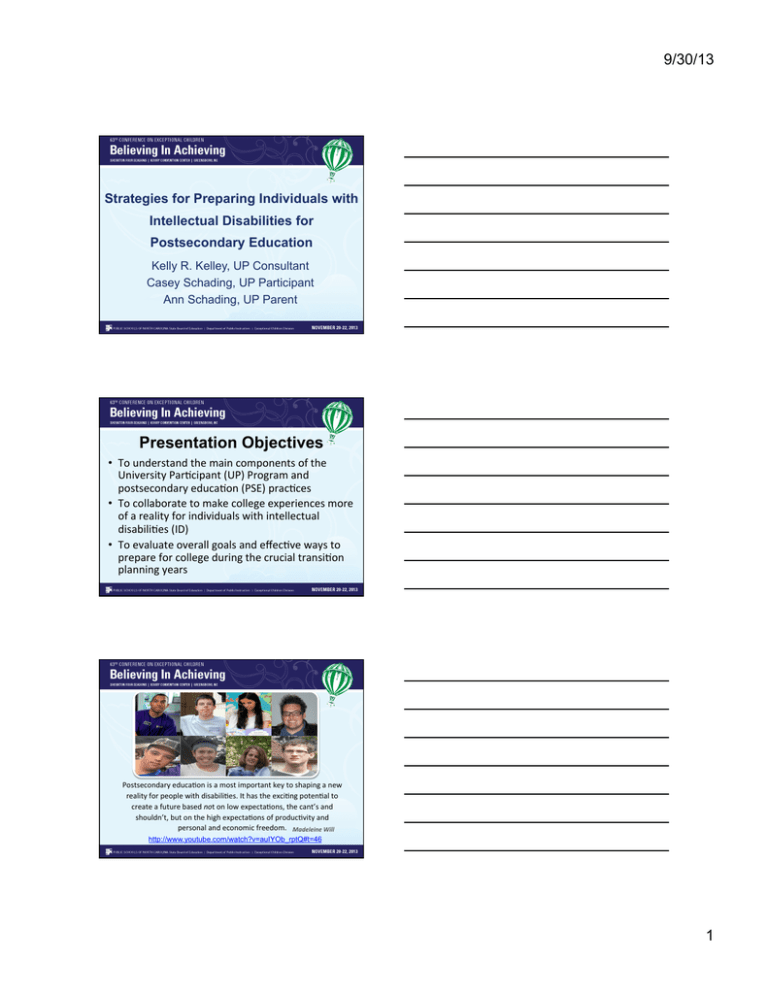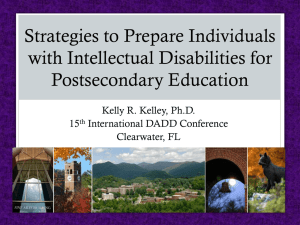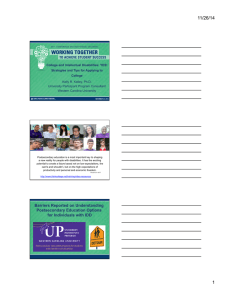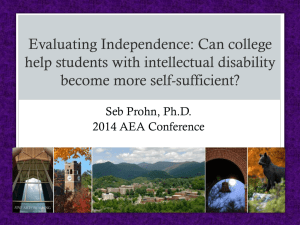Document 12154095
advertisement

9/30/13 Strategies for Preparing Individuals with Intellectual Disabilities for Postsecondary Education Kelly R. Kelley, UP Consultant Casey Schading, UP Participant Ann Schading, UP Parent Presentation Objectives • To understand the main components of the University Par6cipant (UP) Program and postsecondary educa6on (PSE) prac6ces • To collaborate to make college experiences more of a reality for individuals with intellectual disabili6es (ID) • To evaluate overall goals and effec6ve ways to prepare for college during the crucial transi6on planning years Postsecondary educa6on is a most important key to shaping a new reality for people with disabili6es. It has the exci6ng poten6al to create a future based not on low expecta6ons, the cant’s and shouldn’t, but on the high expecta6ons of produc6vity and personal and economic freedom. http://www.youtube.com/watch?v=auIYOb_rptQ#t=46 1 9/30/13 thinkcollege.net What is the UP Program? • The UP Program is a two year, inclusive program for college-aged individuals with intellectual disabilities. • Operated as a pilot program from 2007 to 2010; 2 participants completed the program by 2010. • Expanded to 4 participants in 2010, 4 additional in 2011 for a total of 8 participants. • Funded as a model demonstration site in 2010 for NC by U.S. Department of Education. Admission Criteria Between the ages of 18 and 25 at the time of admission Previously enrolled in a high school special education program that does not lead to completion of a regular high school diploma and that does not allow students to complete requirements necessary for regular admission to WCU Demonstrates adequate communication skills and socially acceptable behavior to interact with others on the WCU campus Motivated to learn and benefit from participation in the UP Program Have an expressed interest in living and working as independently as possible in their community after completing the UP program and supported by parents and families to do so 2 9/30/13 Five UP Program Components Personal Development Course Auditing Social Participation and Learning Community Participation Vocational Preparation Participants must pay current university fees for auditing courses UP Certificate Requirements *Individual Plan for College Participation (IPCP) What do UP Participants do at WCU? • Live in campus residence halls and experience college life with same age peers • Have an individual plan that would allow personal development for post-UP success • Attend and audit a limited number of classes • Participate in social events and activities 3 9/30/13 Barriers Reported on Understanding PSE Options for Individuals with ID 4 9/30/13 Barriers from Families • Inadequate transition planning • Lack of general information or guidance of options • School and other staff expectations and attitudes about PSE options • Financial constraints • Different services did not work well together • Long waiting lists for services • Staff from different places giving different advice • Written and online materials difficult to understand (Griffin, McMillan, & Hodapp, 2010) Barriers with Transition Planning • Insufficient or ineffective transition planning and implementation • Gaps in student preparedness • Inadequate supports and missed opportunities to participate • Systematic low expectations held for students with ID • Lack of awareness among transition personnel of available PSE options • Exclusionary social perceptions and conventions (Griffin, McMillan, & Hodapp, 2010; Grigal, Hart, & Migliore, 2011; Stodden & Whelley, 2004…) Promising Practices for Preparing Individuals with ID for Postsecondary Education (and Adulthood) We ALL Have a Role! 5 9/30/13 Inclusion: Still Needed UP participants who have had more inclusive living and learning experiences before coming to college seem to adjust better to living and participating on campus. (Grigal, Hart, & Migliore, 2011) Employment First • Need a stronger focus on the importance of gainful employment and teaching job/soft skills to enter the competitive workforce rather than segregated adult day services that are non-work or sheltered workshops. (Grigal, Hart, & Migliore, 2011; Wehman, 2013) Families are KEY! • Families must be active supporters who value PSE experiences, but also want integrated outcomes for their adult children. Expectations should be explicitly stated and agreed upon from the beginning of the partnership. (Wehman, 2013) 6 9/30/13 Start EARLY! • Community involvement and job shadowing experiences PRIOR to entering college and during PSE experiences are crucial for paid employment outcomes and integrated community living (from elementary school on). Our focus is to train and gain competitive employment at graduation with participants productively living in their communities. It is all about good quality of life and meaningful days! Take Time to Evaluate/Reflect • Evaluation helps everyone grow and work together by reflecting every step of the way and making changes when needed! Evaluation/Reflection areas might include: – Job performance – Class performance – Natural Supports/Goals/Attitudes – External Program Evaluation – Family Focus Groups – Follow up data/Surveys/Outcomes Allow Voice and Choice • PSE programs typically have to train or retrain students about person-centered planning, self-determination, and selfadvocacy at the college level. Participants gain control over time and lead their own person-centered planning meetings. We must listen to our students and allow abundant opportunities for student VOICE and CHOICE! Sometimes this involves natural consequences and risks. 7 9/30/13 Flexibility in Supports • It sometimes takes a village…at first. In planning supports, different participants will require varied supports. As time passes, the amount and type of support will likely change. (Grigal, Hart, & Migliore, 2011) Setting Attitudes/Expectations • Be ready to celebrate successes and do not set limits to expectations. Many participants rise above and beyond the attitudes and expectations that have been set for them. Be prepared for surprises and determination when given more opportunities. Role of Natural Supports • It is hard to have a meaningful, inclusive, natural on-campus experiences without the involvement of many natural supports. This is a scheduling headache, but it is essential. 8 9/30/13 Interagency Collaboration/ Person First • Interagency collaboration requires negotiation. PSE programs don’t fit into the traditional service system for young adults with ID. Involving various agencies requires understanding their roles and eliciting their cooperation. Awareness Gains Good Allies • It is still true that most college students want the world to be a better place. When they learn that participants are trying to succeed, they will be very supportive beyond college and in their communities. Casey’s Perspective • Most prepared for college? • Least prepared? • What are you learning in college that you might not have gotten from staying closer to home? 9 9/30/13 Ann’s Perspective • How was Casey most prepared for college? Least prepared? • What are you learning as a parent during Casey’s college experience? • What could schools or agencies do to help? Contact Information Kelly R. Kelley, Ph.D. UP Program Consultant Assistant Prof. of SPED kkelley@email.wcu.edu 828.227.2990 up.wcu.edu 10



